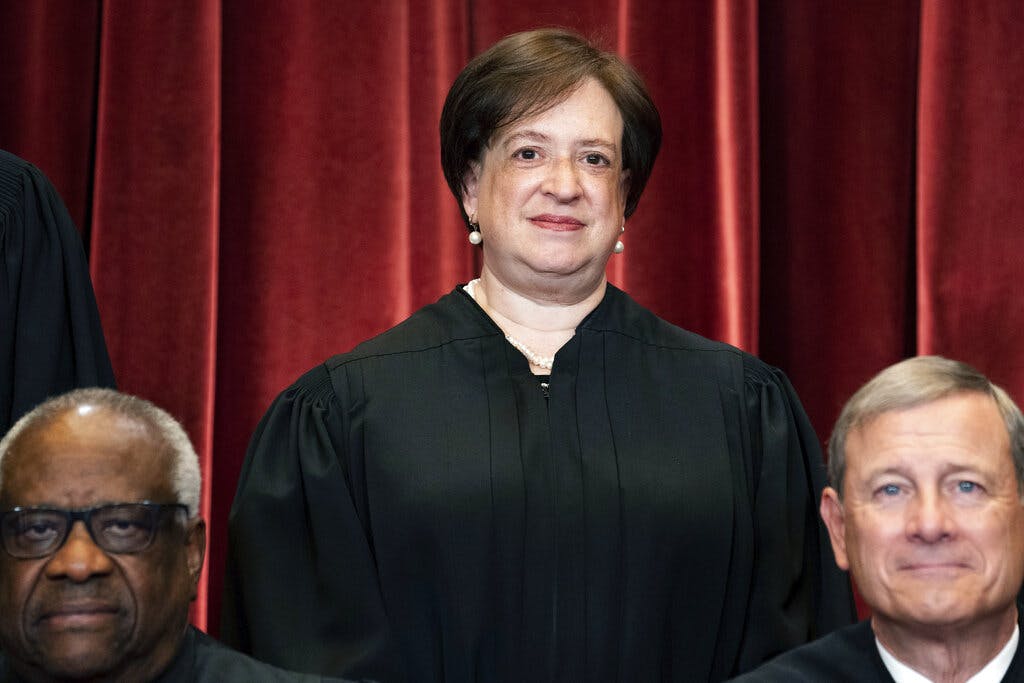Justice Kagan Is Making Her Move
The one-time solicitor general and dean of Harvard Law School is increasingly making arguments aimed at the court of public opinion.

The Supreme Court’s yearly term has not even begun, and Justice Elena Kagan already has lots to say. In advance of the traditional first Monday in October opening, the one-time solicitor general and dean of Harvard Law School is increasingly making arguments aimed at the court of public opinion.
With the court’s conservative ascendance showing no signs of slowing, Justice Kagan’s latest salvos suggest that she is angling to be a kind of “shadow chief justice,” or leader of the liberal wing. Unable to make headway in swaying her conservative colleagues on big constitutional questions, she appears to be pursuing an outside game focused on the court writ large.
Both Justice Kagan and Chief Justice Roberts commented on the court’s public perception this week, cementing the sense that they see themselves as something between kindred spirits and well-matched antagonists. Two of this court’s most prominent public faces exemplify its divide and perhaps hint at its possible dealmaking center.
The chief, in his remarks in respect of the roiling public debate in the wake of Dobbs v. Jackson Women’s Health, asserted, “I don’t understand the connection between opinions people disagree with and the legitimacy of the court” and said “simply because people disagree with an opinion is not a basis for questioning the legitimacy of the court.”
Justice Kagan took a different tack, placing the blame not on critics but on the court. She opined that when people see courts “as trying just to impose personal preferences on a society irrespective of the law, that’s when there’s a problem — and that’s when there ought to be a problem.” She did not mention Dobbs, but she likely did not have to; the same could be said regarding Roe.
It should be no surprise that justices have taken to public fretting. Pew discloses that support for the court is in free fall, largely due to a precipitous swing among left-leaning voters. Just 28 percent of that demographic view the court favorably, down 18 points since January and 40 points from two years ago.
In remarks at Northwestern University School of Law, Justice Kagan had sharp words to explain that decline. According to Law360, she observed that a “court is legitimate when it is acting like a court” and warned that “when the court gets involved in things that it doesn’t have to, especially if those things are very contested in a society, it just looks like it is spoiling for trouble.”
Justice Kagan, however, has not been content merely to follow Chief Justice Roberts’s solicitude for the court’s public perception. In recent days, she has linked those concerns to a repudiation of the judicial philosophy of “originalism,” defined by the Legal Information Institute as arguing that “the Constitution should be interpreted as it was understood at the time of its adoption.”
This is a noteworthy development because in her 2010 Senate confirmation hearing in respect of her nomination to the high court, Justice Kagan quipped that “we are all originalists now,” a nod to the ascendancy of what was once an outré philosophy to the mainstream of Supreme Court practice. Dobbs, in its insistence on constitutional intent over penumbric speculation, is the fruit of that jurisprudence.
It appears that while Justice Kagan was an originalist then, she is no longer one now, sharing at Northwestern that her “thinking about originalism is, I’m not sure what it means given that it seems to be sort of fluctuating over time and over cases in ways that, again, makes you concerned that the rules change as the desired outcomes change.”
The justice, sounding like she was penning a dissent, argued that “originalism, as some of my colleagues understand it, doesn’t work so well because it’s just inconsistent, I think, with the way the Constitution is written.” She asserted: “If you’re a textualist, you’re not a textualist just when it’s convenient.”
Musing on the court’s decision in West Virginia v. EPA, which held that explicit congressional authorization is required for the agency to address “major questions,” Justice Kagan remarked simply, “What is a major question, you know, who knows.” She ascribed the decision to her colleagues not being “all that comfortable with this kind of environmental regulation” and not “being big fans of regulation.”
In a 2018 dissent, Justice Kagan castigated the court’s majority as aspiring to be “black-robed rulers overriding citizens’ choices.” However, this jurist, who one colleague at Harvard described as possessed of such clarity of thought that her mind is “like a bell,” increasingly looks like she has designs to rule not the country, but the court.

